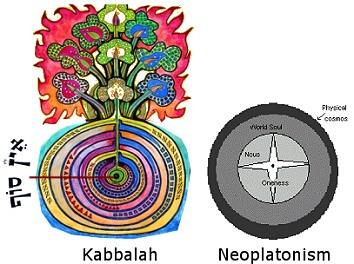|
Should we Study Kabbalah?
You might be surprised to learn that Jewish tradition regards the idea of "Torah" to include not just the written words of Moses (i.e., the written Torah) or even the words of the sages codified in the the Talmud (i.e., the oral Torah), but also to a "hidden revelation" (Torat Ha-Nistar) that was eventually codified in the Zohar, a mystical commentary on the contents of the written Torah. Collectively understood, the dialog and history regarding mystical thinking within Jewish tradition may be called "Kabbalah," a term that means "that which is received" in terms of hidden or secret teachings of Torah.
It should be noted that the serious Kabbalah study (as opposed to New Age or popularized versions) is closely connected to traditional Jewish texts, teachings, and theology -- and is incomprehensible without them. It's been said that attempting to understand Kabbalah without first understanding Torah, Talmud, Midrash, minhagim (customs), etc., is like trying to fathom quantum mechanics without first mastering high school physics.
Now while that may be true regarding more recent conversations about Kabbalah, and despite the claim by many of its practitioners that the "hidden Torah" traces back to the patriarch Abraham (and even to Adam in the Garden of Eden), it is generally known that Kabbalah is essentially a Jewish form of Neoplatonic philosophy, that is, an attempt to synthesize Hellenism (i.e., the Greek thinking of Plato and Aristotle) and Gnosticism with Judeo-Christian revelation. The truth of this statement will be vindicated in further articles on this site.
 |
For many Christians, Kabbalah is considered dangerous, though it should immediately be pointed out that there are different kinds of Kabbalah, some of which are decidedly occultic (e.g., so-called "hermetic Kabbalah"), while others closely resemble the speculations and discussions of Christian theology. To say that all Kabbalah is dangerous (or deceptive) is therefore a bit misleading, though a case can be made that some of it is spiritually distracting, especially in light of the teaching of the Mashiach Yeshua. Of course, as any seminary student knows, the same might be said about the work of various Christian theologians as well.
The Popular Rise of Kabbalah

The study of Kabbalah has become nearly "mainstream" these days. Go to any major book store and take a look through the Judaism section. There you're likely to see a number of books, tapes, and DVDs offering to guide you into the "mystical side" of Jewish spirituality. Several Hollywood stars openly promote its teachings, and various TV stations run specials on the subject. Indeed, the fastest growing movement in Judaism is Chabad-Lubavitch, which is Kabbalistic in its approach.
Perhaps part of the reason for the explosive popularity of Kabbalah has to do with the stress and anxiety of our age. Indeed, we are living in a perilous time when "men's hearts fail them for fear..." Like the ancient Epicureans who sought tranquility and freedom from fear through philosophical speculation (ataraxia), many people today are looking for a way to cope with their unhappiness, angst, and inner pain.... Kabbalah therefore offers a way to escape from seemingly pointless suffering by claiming that we all can reconnect with "God, the universe, and everything."

Because of its growing influence, I decided to begin writing some articles on this site exploring the subject of Kabbalah -- both for "apologetical" purposes and because understanding it may add insight into our own faith. Kabbalah might initially seem "strange" to you if you are not in the habit of asking questions about ultimate reality, but don't let that put you off. Using godly discernment, Kabbalah's alternative perspectives can cause you to think hard about your faith and even to refine your understanding of the Messiah. Like other philosophies, Kabbalah asks questions about the nature of God, the origin of the universe, the meaning of life, the goal of history, and so on. In fact, many of Kabbalah's questions and doctrines were a regular part of the dialogs found in Medieval Christian theology.... And even today various Christian theological systems attempt to explain the origin, purpose, and goal of creation.
For example, some Christian theologians refer to a "secret agreement" made within the Godhead before the creation of the world that God the Father would send His Son to become the suffering Redeemer of an alienated humanity, and that the Holy Spirit would be the agent of restoration in the fallen world... Within the very nature of the Christian Trinitarianism, in other words, there is the idea of creation, of redeeming a "fallen" humanity, and of restoring all things back to final unity when God would ultimately be "all-in-all"... This attempt to provide an overarching narrative to the universe and its purpose is not unlike some of the philosophical theology of Kabbalah.
|




